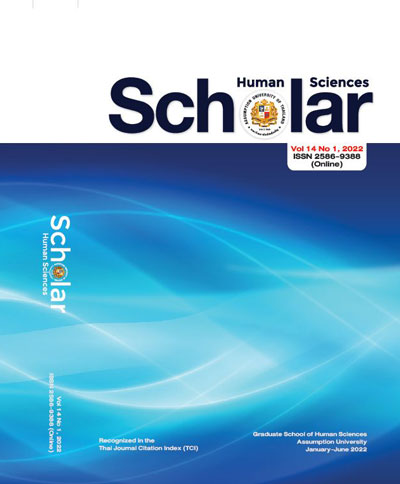A STUDY OF GRADE 12 STUDENTS’ PERCEPTIONS ON THE USE OF THE COOPERATIVE LEARNING APPROACH FOR THE ENGLISH LANGUAGE TEACHING AND LEARNING AT THE SELECTED SCHOOL IN BANGKOK, THAILAND
Keywords:
Cooperative Learning Approach, Students’ Perceptions, English Language Teaching, and Learning.Abstract
This study was mainly to determine the students’ perceptions on the use of cooperative learning approach for the English language teaching and learning at the selected school in Bangkok, Thailand and to determine whether there were any significant differences between students’ perceptions on the use of cooperative learning approach for English teaching and learning and students’ gender and achievement (GPAX). The respondents were 130 grade 12 students and two English teachers at the selected school during academic year 2020. The data were collected by questionnaire and two interview forms. The data were analyzed by descriptive statistics (mean and standard deviation, independent sample t- test and ANOVA) and content analysis.
The findings of this study indicated that (1) the grade 12 students’ perceptions were positive in all areas to cooperative learning activities in English language teaching and learning at the selected school; (2) there were no significant differences between students’ gender and perceptions of the use of cooperative learning , there were also no significant differences between students’ achievement (GPAX) and perceptions of the use of cooperative learning. (3) the students found that the effects of cooperative learning include great communication, increase motivation and interest while sometimes the class would be noisy; the teachers found that the effects of cooperative learning include improvement of contribution and discussion between students, decrease problems of teaching while group work would spend more time.
References
Baker, C., and Phongpaichit, P. (2005). A history of Thailand. Cambridge: Cambridge University Press.
Baker, W. (2008). A critical examination of ELT in Thailand: The role of cultural awareness. RELC Journal, 39(1), 131-146.
Brown, C. (2015) Leading the Use of Research and Evidence in Schools, IOE Press, London.
Bayat, Ö. (2004). The effects of cooperative learning activities on student attitudes towards English reading courses and cooperative learning (Doctoral dissertation, Bilkent University).
Darasawang, P. (2007). English language teaching and education in Thailand: A decade of change. In D. Prescott (Ed.), English in Southeast Asia: Varieties, literacies, and literature (pp. 185-202). Newcastle, UK: Cambridge Scholars Publishing.
Faryadi, Q. (2007). Enlightening advantages of cooperative learning. Retrieved from: https://files.eric.ed.gov/fulltext/ED495702.pdf
Foley, J. (2005). English in Thailand. RELC Journal, 36(2), 223–234.
George, D., and Mallery, M. (2003). Using SPSS for Windows step by step: a simple guide and reference.
Johnson, D. W., Johnson, R. T., and Smith, K. A. (2014). Cooperative learning: Improving university instruction by basing practice on validated theory. Journal on Excellence in University Teaching, 25(4), 1-26.
Johnson, D. W., and Johnson, R. T. (2005). New developments in social interdependence theory. Psychological Monographs, 131(4), 285-358.
Neo, T. K., Neo, M., Kwok, W. J., Tan, Y. J., Lai, C. H., & Zarina, C. E. (2012). MICE 2.0: Designing multimedia content to foster active learning in a Malaysian classroom. Australasian Journal of Educational Technology, 28(5).
Piwchai, K. (2015). A study of the perception of teachers and students toward cooperative learning in an English course at a private school in Thailand. Thammasat University Theses10.14457/TU.the.2015.1384
Rahimi, M., Riazi, A., and Saif, S. (2008). An investigation into the factors affecting the use of language learning strategies by Persian EFL learners. Canadian Journal of Applied Linguistics, 11(2), 31-60.
Sawatsupaphon, S. (2017). A Relationship Study Between Grade 12 High School Students’ Positive Psychological Capital and Demographics At A Top Government School In Bangkok, Thailand (master’s thesis). New Zealand College of Higher Education. Auckland, New Zealand.
Siebert, L. L. (2003). Student and teacher beliefs about language learning. Ortesol Journal, 21, 7.
Wang, M. C., Haertel, G. D., and Walberg, H. J. (1993). Toward a knowledge base for school learning. Review of educational research, 63(3), 249-294.
Wei, P., and Tang, Y. (2015). Cooperative learning in English class of Chinese junior high school. Creative Education, 6(03), 397.
Wichadee, S., and Orawiwatnakul, W. (2012). Cooperative language learning: Increasing opportunities for learning in teams. Journal of College Teaching & Learning (TLC), 9(2), 93-100.
Wongsothorn, A. (2000). Thailand. In H. W. Kam and R. Y. L. Wong (Eds.), Language policies and language education: The impact in East Asian countries in the next decade (pp. 307-320). Singapore: Times Academic Press.
Wongsothorn, A., Hiranburana, K., and Chinnawongs, S. (2003). English Language Teaching in Thailand today. In H. Wah Kam, and Wong, R.L. (Ed.), English language teaching in East Asia today: changing policies and practices (pp. 441-453). Singapore: Eastern Universities Press.




